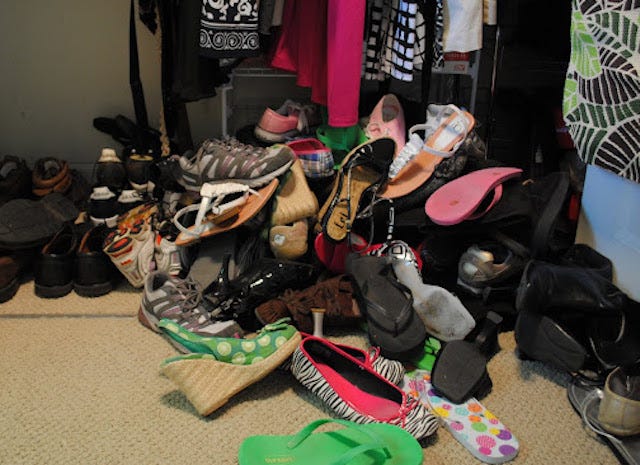Can your kid say "No" to peers? Having good boundaries is a skill you can start teaching today.
How to gamify healthy boundaries so your kid doesn't get taken advantage of when you're not around.
Parenting Matters #70
By: Catherine Lynch and Glenn Collins
Dear Awesome Parent,
Got littles? They have no trouble at all holding their boundaries. Saying “No” is not a problem for them. In fact, it’s one of their favorite words! 🤣
Got big kids? Their friends are pushing their boundaries. If your kids aren’t good at saying “No”, they’ll get talked into doing things they shouldn’t do. And if they don’t eventually figure out how to say “No”… well, that’s today’s story: an adult grandchild starting graduate school who’s having boundary issues on Day 1.
Want to help your kid practice their boundary skills while they’re still at home? We’ve gamified that to make it easy for you. But first, the backstory:
“I let her have the bigger bedroom with more closet space, but now she says she needs to put her shoes in my closet because there isn’t enough room in her’s. I didn’t say anything because I don’t want us to get off on the wrong foot. We’re going to be living together for the next year after all.”
That statement immediately raised red flags. It screamed "boundary issues” to us.
We were talking with our granddaughter about the exciting new chapter she’s starting in her life: She’s heading off to Philadelphia to graduate school for a professional degree in the medical field. But the conversation quickly turned to her anxiety about her roommate situation.
Our granddaughter had rented a 2-bedroom apartment and found another incoming student to sublet the other bedroom. They’d texted and talked on the phone and she really liked her new roommate.
And then move-in day arrived. When our granddaughter got to the apartment, her roommate was there with her entire family and she’d already brought in all of her stuff. Her cooking equipment and supplies filled most of the kitchen space and she’d used a majority of the closet in the living room. That’s when she informed our granddaughter about the shoe problem and her solution. Her shoes in our granddaughter’s closet. And our granddaughter didn’t tell her “No”.
The problem isn’t really the roommate. The problem is our granddaughter’s inability to say “No”. To establish boundaries and hold firmly to them. This comes from a lifetime of not being encouraged to stand up for herself and what she wants. To go along with what other people want in order to get along. But “getting along” at the expense of standing up for yourself isn’t healthy, doesn’t promote self respect, and degrades our relationships with other people.
Holding boundaries and saying “No” is a skill. And like any other skill, it’s one that gets easier and better with practice. But where can kids get the practice they need to develop their boundary holding skills? Who can they practice on? When they practice with their peers, their parents can’t coach them on how to do it, so that’s not optimal. The other obvious place to learn is at home with their parents.
Our granddaughter didn’t get much practice holding firm to her boundaries when she lived at home with her parents, so its really no surprise that she’s not good at doing it now and her roommate is taking advantage of her.
Parents want their kids to have good boundaries, just not with them. They don’t appreciate it when their kids attempt to practice their boundary holding skills on them. When parents ask their kids to do something (something the kids might consider boundary-crossing), parents expect to be obeyed. They certainly don’t expect their kid hold a boundary and say “No”.
“Natalie, you’ve been spending too much time on your phone alone in your room lately. I need to see your phone.” “No mom, you can’t see my phone.”
“Angie, you mother and I have decided that you can’t spend the night a Emily’s this weekend. Her parents are out of town and we’re not comfortable with that.” “No dad, I’ve decided I’m going to spend the night at Emily’s.”
“Michael, it’s time for bed. Put away your game and go brush your teeth.” “No, I’ve decided I’m going to stay up later tonight.”
That wouldn’t cut it at our house, and we bet it wouldn’t be ok at your house either.
So how exactly do you teach your kids how to say “No” when someone is really pushing their boundaries?
You gamify it.
First, the prep work:
You introduce the word boundaries.
“Hey, you know how when someone is trying to get you to do something you don’t want to do/know you aren’t supposed to do? That’s called “Pushing your boundaries.”
You give some examples from your own experience, from popular culture, or situations your kid has told you about from their friend group where someone doesn’t hold their boundaries and situations where they do.
Now ask if they’ve ever had someone try to cross their boundaries. Encourage them to talk about their experiences. Note: they might not be willing to do this if they’ve been punished in the past for this. Tread slowly and gently.
Then, introduce the game. Say something like this: I’m gong to push your boundaries every day this week without telling you I’m doing it. It’s your job to catch me at it. To be firm. To not let me. To call me on it. To clearly say “No” to me. So for example, I might try to make you do something unsafe or against our families’ values. I’ll work hard to be convincing, and do it with a straight face, so you think I’m serious.
Teaching your kid about boundaries and how to hold them is a critical life skill. Without it, other people will forever be crossing their boundaries. At work, with friends, in intimate relationships, and even with strangers - having poor boundaries is a surefire recipe for unhappiness. For feeling powerless and being taken advantage of.
The sooner you start talking about boundaries with your kids and letting them practice, the more comfortable they’ll feel saying “No” in a world where young people, and especially girls, are supposed to say “Yes”. And the more practice they get, the better they’ll be at saying “No” when you aren’t there. When it’s important.
Home Practice:
Talk to your spouse about the importance of letting your kid practice healthy boundaries when they’re young so they’re good at it when they’re grown. Remind them of some of the bad things you’d rather your kid not do or experience.
Challenge your family to find examples of characters of people pushing each other’s boundaries in movies, TV shows and books. This helps make it a regular topic of conversation in your house so your kids are well steeped in the concept.
Practice holding healthy boundaries with your friends, spouse and other family members so you have a fresh reminder of just how hard it is.
Play the boundary game with your kid, review what happened with your spouse and your kid and let us know how it went!
Our Special Day Lillies
It’s July and here in Maryland the Day Lillies are in peak bloom. These particular Day Lillies are especially important to us - we bought them on one of our very first dates and they’ve been blooming in our yard ever since. 😃❤️





